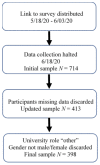The Acute Effects of the COVID-19 Pandemic on Physical Activity and Sedentary Behavior in University Students and Employees
- PMID: 33042377
- PMCID: PMC7523895
- DOI: 10.70252/QCVG2516
The Acute Effects of the COVID-19 Pandemic on Physical Activity and Sedentary Behavior in University Students and Employees
Abstract
The COVID-19 pandemic has closed non-essential businesses which may alter individuals' leisure behaviors. Consequently, physical activity and sedentary behavior may be negatively impacted as many fitness and recreational centers have been closed. This study aimed to examine the impact of the pandemic on physical activity and sedentary behavior in a sample of university students and employees before and after the university cancelled face-to-face classes and closed campus. Participants (N = 398) completed the validated Godin physical activity questionnaire and the International Physical Activity Questionnaire which assessed physical activity and sedentary behavior pre- and post-cancellation of face-to-face classes. Participants were also separated in the groups (low, moderate, high physical activity) based upon a tertile split of pre-pandemic total physical activity. Physical activity group by time ANOVAs were used to assess potential changes in total physical activity and sedentary behavior. Post-cancellation sedentary behavior was greater (F (1, 388) = 9.2, p = 0.003, partial η2 = 0.032) than pre-cancellation. Physical activity group moderated (F (2, 395) = 22.0, p < 0.001, partial η2 ≥ 0.10) changes in total physical activity from pre- to post cancellation. The high activity group decreased physical activity whereas the moderate and low activity groups increased physical activity (t ≥ 2.4, p ≤ 0.02, Cohen's d = 0.23). While the university closure increased sedentary behavior across the sample, it only decreased physical activity in participants who were the most active pre-cancellation. Pandemic-related closure of facilities designed for physical activity may disproportionately impact active individuals.
Keywords: Novel Coronavirus 2019; behavior change; bodyweight; inactivity; sitting.
Figures
References
-
- Ammar A, Brach M, Trabelsi K, Chtourou H, Boukhris O, Masmoudi L, Bouaziz B, Bentlage E, How D, Ahmed M, Müller P, Müller N, Aloui A, Hammouda O, Paineiras-Domingos L, Braakman-Jansen A, Wrede C, Bastoni S, Pernambuco C, Mataruna L, Taheri M, Irandoust K, Khacharem A, Bragazzi N, Chamari K, Glenn J, Bott N, Gargouri F, Chaari L, Batatia H, Ali G, Abdelkarim O, Jarraya M, El Abed K, Souissi N, Van Gemert-Pijnen L, Riemann B, Riemann L, Moalla W, Gómez-Raja J, Epstein M, Sanderman R, Schulz S, Jerg A, Al-Horani R, Mansi T, Jmail M, Barbosa F, Ferreira-Santos F, Šimunič B, Pišot R, Gaggioli A, Bailey S, Steinacker J, Driss T, Hoekelmann A On behalf of the eclb-covid19 consortium. Effects of covid-19 home confinement on eating behaviour and physical activity: Results of the eclb-covid19 international online survey. Nutrients. 2020;12(6):1583. - PMC - PubMed
-
- Barkley JE, Farnell GS. The relationship between body mass index (bmi) and sedentary behavior is mediated by negative peer interaction in boys. IJPEFS. 2019;8(1):59–65.
-
- Barkley JE, Lepp A, Glickman EL. "Pokémon go!" May promote walking, discourage sedentary behavior in college students. Games for Health J. 2017;6(3):165–170. - PubMed
LinkOut - more resources
Full Text Sources

